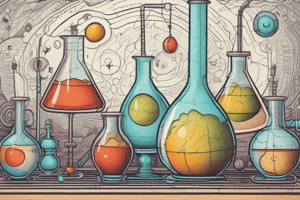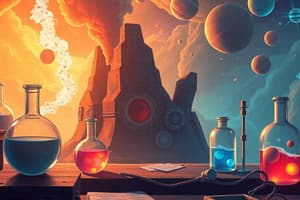Podcast
Questions and Answers
What is the role of controlled variables in an experiment?
What is the role of controlled variables in an experiment?
- They are the factors that the scientist changes to observe effects.
- They are kept constant to ensure that independent variable effects can be isolated. (correct)
- They are the results that are measured to determine the impact of the independent variable.
- They are additional factors that are manipulated alongside the independent variable.
In the experiment studying the effect of water on plant growth, which of the following is considered the dependent variable?
In the experiment studying the effect of water on plant growth, which of the following is considered the dependent variable?
- Sunlight exposure of the plants
- Amount of water given to the plants
- Height of the plants measured at specific intervals (correct)
- Soil composition used for planting
Why is a control group necessary in an experiment?
Why is a control group necessary in an experiment?
- To provide a variant for comparison against the independent variable.
- To track the changes in the dependent variable over time.
- To compare the experimental outcomes with a standard baseline. (correct)
- To ensure that the independent variable has no effect on results.
Which of the following is an example of an independent variable in the osteoporosis drug study?
Which of the following is an example of an independent variable in the osteoporosis drug study?
Which of the following statements about controlled variables is true?
Which of the following statements about controlled variables is true?
What is the purpose of a science experiment?
What is the purpose of a science experiment?
Which of the following correctly describes the independent variable in an experiment?
Which of the following correctly describes the independent variable in an experiment?
What is typically the first step in the scientific method?
What is typically the first step in the scientific method?
Why do scientists generally only change one independent variable at a time?
Why do scientists generally only change one independent variable at a time?
What happens to a hypothesis after data analysis in an experiment?
What happens to a hypothesis after data analysis in an experiment?
Flashcards
Science Experiment
Science Experiment
A structured way of testing hypotheses to uncover natural phenomena.
Scientific Method
Scientific Method
A series of steps that include observation, measurements, experimentation, and analysis.
Independent Variable
Independent Variable
The part of an experiment that is changed by the scientist.
Dependent Variable
Dependent Variable
Signup and view all the flashcards
Variable
Variable
Signup and view all the flashcards
Controlled (or Constant) Variable
Controlled (or Constant) Variable
Signup and view all the flashcards
Control Group
Control Group
Signup and view all the flashcards
Dependent Outcome
Dependent Outcome
Signup and view all the flashcards
Study Notes
Science Experiments
- Science experiments systematically test hypotheses to understand natural processes.
- Scientists use experiments to study how genes affect animal development. This might involve removing a gene from one group of organisms and comparing their growth and development to a control group.
- Experiments are fundamental to scientific understanding and drive advancements like new drugs, treatments, and technological progressions.
- Experiments help us understand our impact on ecosystems and how to preserve them.
The Scientific Method
- The scientific method is a systematic approach to experimentation.
- It involves observation, measurement, experimentation, and analysis.
- The process begins with observing phenomena or researching existing knowledge.
- A question is developed to guide the experiment.
- A hypothesis, or educated guess, predicts the outcome.
- An experiment collects data to test the hypothesis.
- The hypothesis is either accepted or rejected and revised. This process continues to answer further questions.
Variables in Experiments
- Experiments always involve variables, which are factors that can change.
- Scientists typically change only one variable (independent variable) at a time to isolate its effect.
- The variable being measured is called the dependent variable.
- Controlled variables are factors kept constant to rule out other influences.
- Examples: In a plant growth experiment, water is the independent variable, plant height is the dependent variable, and sunlight, soil, and temperature are controlled variables.
Controls in Experiments
- Controls are crucial for comparison in experiments.
- A control group is treated identically to the experimental group, except doesn't receive the treatment being tested.
- This provides a baseline to measure the impact of the experimental factor.
- For example, in a drug study, one group receives the drug (the experimental group) and another receives a placebo (the control group). The control group's response lets researchers assess if the drug is effective.
Studying That Suits You
Use AI to generate personalized quizzes and flashcards to suit your learning preferences.




